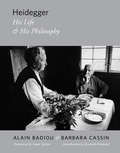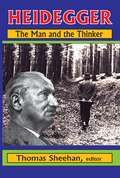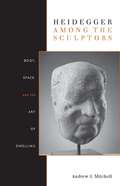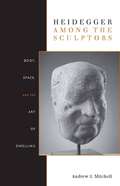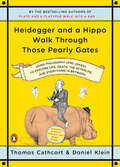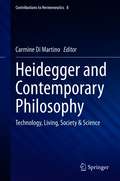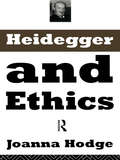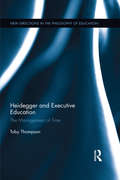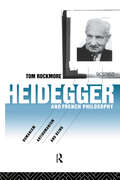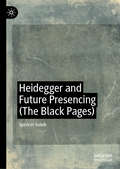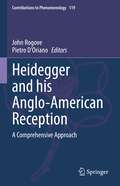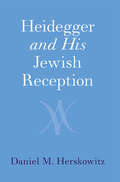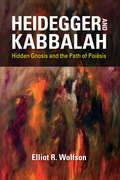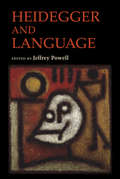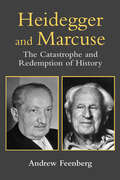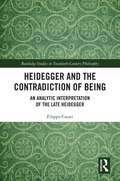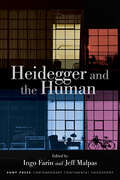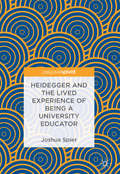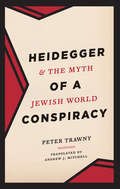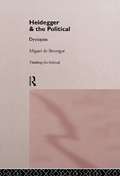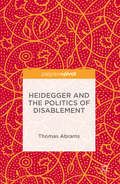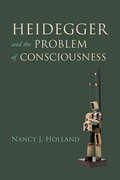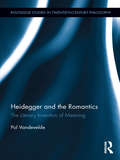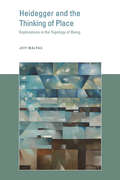- Table View
- List View
Heidegger: His Life and His Philosophy
by Susan Spitzer Kenneth Reinhard Alain Badiou Barbara CassinMartin Heidegger was an ordinary Nazi and a loyal member of the provincial petty bourgeoisie. He was also a seminal thinker of the Continental tradition and one of the twentieth century's most important philosophers. How are we to make sense of this mix? Should we factor Heidegger's domestic and political associations into our understanding of his thought, or should we treat his intellectual work independently of his abhorrent politics? How does any thinker reconcile the mundane with the ideal, or the pursuit of philosophical inquiry with the demands of civic engagement?In Heidegger, Alain Badiou and Barbara Cassin immerse themselves in the philosopher's correspondence to answer these questions as they relate to Heidegger and all thinkers vulnerable to their times. They focus on Heidegger's tormented relationship with his wife, Elfrida, Hannah Arendt, and numerous other women, bringing an unusual level of intimacy to his personal and intellectual worlds.
Heidegger: The Man and the Thinker (New Heidegger Research Ser.)
by Sheehan ThomasMany people consider Martin Heidegger the most important German philosopher of the twentieth century. He is indisputably controversial and influential. Athough much has been written about Heidegger, this may be the best single volume covering his life, career, and thought. For all its breadth and complexity, Heidegger's perspective is quite simple: he is concerned with the meaning of Being as disclosure.Heidegger's life was almost as simple. He was a German professor, except for a brief but significant period in which he supported the Nazi regime. While that departure from philosophy continues to haunt his name and work, one must question whether his thought from 1912 to 1976 should be measured by the yardstick of his politics from May, 1933, through February, 1934. Th is anthology addresses his complex but simple thought and his simple but complex life.In a real sense, Sheehan claims, there is no content to Heidegger's topic and legacy, only a method. But method must not be taken to mean a technique or procedure for philosophical thinking. Rather, the topic of Heidegger's thought and his pursuit of that topic, the "what" and the "how," are one and the same thing.Heidegger writes, "Alles ist Weg," "Everything is way," and man's Being is to be on-the-way in essential movement. Heidegger, argues in our essence we humans are the topic and the point is not to be led there so much as to come to know what we already know and to become what we already are. This brilliant collection confirms this truism, and is an excellent introduction to the work of this seminal thinker.
Heidegger Among the Sculptors
by Andrew MitchellIn the 1950s and 60s, Martin Heidegger turned to sculpture to rethink the relationship between bodies and space and the role of art in our lives. In his texts on the subject-a catalog contribution for an Ernst Barlach exhibition, a speech at a gallery opening for Bernhard Heiliger, a lecture on bas-relief depictions of Athena, and a collaboration with Eduardo Chillida--he formulates his later aesthetic theory, a thinking of relationality. Against a traditional view of space as an empty container for discrete bodies, these writings understand the body as already beyond itself in a world of relations and conceive of space as a material medium of relational contact. Sculpture shows us how we belong to the world, a world in the midst of a technological process of uprooting and homelessness. Heidegger suggests how we can still find room to dwell therein. Filled with illustrations of works that Heidegger encountered or considered, Heidegger Among the Sculptors makes a singular contribution to the philosophy of sculpture.
Heidegger among the Sculptors: Body, Space, and the Art of Dwelling
by Andrew J. MitchellMartin Heidegger turned to sculpture to rethink the relationship between bodies and space and the role of art in our lives. In his texts on the subject, a catalog contribution for an Ernst Barlach exhibition, a speech at a gallery opening for Bernhard Heiliger, a lecture on bas-relief depictions of Athena, and a collaboration with Eduardo Chillidahe formulates his later aesthetic theory, a thinking of relationality.
Heidegger and a Hippo Walk Through Those Pearly Gates: Using Philosophy (and Jokes!) to Explore Life, Death, the Afterlife, and Everything in Between
by Thomas CathcartFrom the authors of the bestselling Plato and a Platypus Walk into a Bar, an uproarious new book on the meaning of death (and life, too) The new book by the bestselling authors of Plato and a Platypus Walk Into a Bar is a hilarious take on the philosophy, theology, and psychology of mortality and immortality. That is, Death. The authors pry open the coffin lid on this one, looking at the Big D and also its prequel, Life, and its sequel, the Hereafter. Philosophers such as Schopenhauer, Nietzsche, Camus, and Sartre have been wrestling with the meaning of death for as long as they have been wrestling with the meaning of life. Fortunately, humorists have been keeping pace with the major thinkers by creating gags about dying. Death’s funny that way—it gets everybody’s attention. Death has gotten a bad rap. It’s time to take a closer look at what the Deep Thinkers have to say on the subject, and there are no better guides than Cathcart and Klein. .
Heidegger and Contemporary Philosophy: Technology, Living, Society & Science (Contributions to Hermeneutics #8)
by Carmine Di MartinoThis text illuminates the relevance and importance of Heidegger’s thought today. The chapters address the modern living conditions of intense social transformation intertwined with the continuous and rapid development of technologies that redefine the borders between nations and cultures. Technology globalizes markets, customs, the exchange of information, and economic flows but also – as Heidegger reminds us – revolutionizes the way we relate to bodies, to life, and to earth, by way of introducing both unprecedented opportunities and great dangers.
Heidegger and Ethics
by Joanna HodgeHeidegger and ethics is a contentious conjunction of terms. Martin Heidegger himself rejected the notion of ethics, while his endorsement of Nazism is widely seen as unethical. This major new study examines the complex and controversial issues involved in bringing them together.By working backwards through his work, from his 1964 claim that philosophy has been completed to Being and Time, his first major work, Joanna Hodge questions Heidegger's denial that his enquires were concerned with ethics. She discovers a form of ethics in Heidegger's thinking which elucidates his important distinction between metaphysics and philosophy. Against many contemporary views, she proposes therefore that ethics can be retrieved and questions the relation between ethics and metaphysics that Heidegger had made so pervasive.
Heidegger and Executive Education: The Management of Time (New Directions in the Philosophy of Education)
by Toby ThompsonGlobal corporations and the senior executives who oversee them have been subject to great criticism in recent times: not only do such corporations hold extreme concentrations of wealth, but they continue to sanction staggering pay inequalities between the haves and the have-nots. At the same time, university-based business schools are conducting programmes of executive education seemingly customised to sanction these same inequalities. Heidegger and Executive Education is a piece of critical philosophy that has been written from within the business school in order to examine how this sheltered process of educating in-role corporate executives operates. Thompson claims that executive education is based on a very simple premise: that an executive executes an order, and that executive education is an amelioration of that process. Thompson argues that the easiest way to conceive of executive education is to treat order and execution as cognates, as a single conceptual entity. Thus, he asks, if educating executives in line with the order-execution cognate involves swapping the boardroom for the classroom, and in keeping with the ‘critical’ tag, shouldn’t executive education be about questioning not only the execution, but also the dominant order? The author uses ‘time’ as the philosophical method by which one can undo the order-execution cognate, question the sanctity of the cognate and thereby halt the seemingly inexorable temporal sequence from order through to those orders becoming executed. This book uses Martin Heidegger’s exotic philosophy of time in order to mount a philosophical challenge to the temporal sequentiality of executive education. It will therefore be of great interest to academics, researchers and postgraduates who are interested in Heidegger, the philosophy of education and executive education. It should also be essential reading for those involved in training, developing, and educating corporate executives.
Heidegger and French Philosophy: Humanism, Antihumanism and Being
by Tom RockmoreMartin Heidegger's impact on contemporary thought is important and controversial. However in France, the influence of this German philosopher is such that contemporary French thought cannot be properly understood without reference to Heidegger and his extraordinary influence. Tom Rockmore examines the reception of Heidegger's thought in France. He argues that in the period after the Second World War, due to the peculiar nature of the humanist French Philosophical tradition, Heidegger became the master thinker of French philosophy. Perhaps most importantly, he contends that this reception - first as philosophical anthropology and later as postmetaphysical humanism - is systematically mistaken.
Heidegger and Future Presencing (The Black Pages)
by Spencer GolubThis book applies Heidegger’s writings to experimental fictions and film genres in order to study a being-there that performs itself beyond liveness and a future that is already here. Theatrical mise-en-scène is analyzed as a way of modeling the Heideggerian ontological-existential, exchanging a deeper presencing for the fictional “now” of liveness. The book is organized around ostensible objects that are in fact things-as-such and performs its theme via time-traveling, interruptions, decompositions, incompleteness, failure, geometric patterning, and above all black pages first cited in Tristram Shandy. This is a nuanced, original work that combines unexpected sources with even more unexpected writing, imagery, and correspondences. It is part of Golub’s ongoing project of lyrically reimagining philosophy and the mise-en-scène of theatrical performance (a presence-room of consciousness) in light of one another.
Heidegger and his Anglo-American Reception: A Comprehensive Approach (Contributions to Phenomenology #119)
by John Rogove Pietro D’OrianoThis book presents both a historical overview of the absorption of Heidegger’s thought into English-language philosophical schools as well as a philosophical discussion of his thought provided by contemporary scholars. The text describes the ways in which a philosophical methodology and worldview seemingly so inhospitable to Anglophone academia has managed to find an unlikely home.This volume is roughly divided into two types of contributions: discussions of Heidegger’s reception in the English-speaking world, and outstanding examples of English-language Heidegger scholarship. The first type includes both historiographical accounts of the encounters between Heidegger’s thought and the Anglo-American world, as well as their philosophical expositions and critiques. The second group of chapters reveal the latest contemporary scholarship by contemporary Heideggerians writing in English. It is moreover the first volume to bring together thinkers from both genealogies of Anglo-American Heideggerianism appealing to students and researchers working in both of these camps.
Heidegger and His Jewish Reception
by Daniel M. HerskowitzIn this book, Daniel Herskowitz examines the rich, intense, and persistent Jewish engagement with one of the most important and controversial modern philosophers, Martin Heidegger. Contextualizing this encounter within wider intellectual, cultural, and political contexts, he outlines the main patterns and the diverse Jewish responses to Heidegger. Herskowitz shows that through a dialectic of attraction and repulsion, Jewish thinkers developed a version of Jewishness that sought to offer the way out of the overall crisis plaguing their world, which was embodied, as they saw it, in Heidegger's life and thought. Neither turning a blind eye to Heidegger's anti-Semitism nor using it as an excuse for ignoring his philosophy, they wrestled with his existential analytic and what they took to be its religious, ethical, and political failings. Ironically, Heidegger's thought proved itself to be fertile ground for re-conceptualizing what it means to be Jewish in the modern world.
Heidegger and Homecoming
by Robert MugerauerMartin Heidegger's philosophical works devoted themselves to challenging previously held ontological notions of what constitutes "being," and much of his work focused on how beings interact within particular spatial locations. Frequently, Heidegger used the motifs of homelessness and homecoming in order to express such spatial interactions, and despite early and continued recognition of the importance of homelessness and homecoming, this is the first sustained study of these motifs in his later works. Utilizing both literary and philosophical analysis, Heidegger and Homecoming reveals the deep figural unity of the German philosopher's writings, by exploring not only these homecoming and homelessness motifs, but also the six distinctive voices that structure the apparent disorder of his works. In this illuminating and comprehensive study, Robert Mugerauer argues that these motifs and Heidegger's many voices are required to overcome and replace conventional and linear methods of logic and representation. Making use of material that has been both neglected and yet to be translated into English, Heidegger and Homecoming explains the elaborate means with which Heidegger proposed that humans are able to open themselves to others, while at the same time preserve their self-identity.
Heidegger and Kabbalah: Hidden Gnosis and the Path of Poiēsis (New Jewish Philosophy and Thought)
by Elliot R. WolfsonWhile many scholars have noted Martin Heidegger’s indebtedness to Christian mystical sources, as well as his affinity with Taoism and Buddhism, Elliot R. Wolfson expands connections between Heidegger’s thought and kabbalistic material. By arguing that the Jewish esoteric tradition impacted Heidegger, Wolfson presents an alternative way of understanding the history of Western philosophy. Wolfson’s comparison between Heidegger and kabbalah sheds light on key concepts such as hermeneutics, temporality, language, and being and nothingness, while yielding surprising reflections on their common philosophical ground. Given Heidegger’s involvement with National Socialism and his use of antisemitic language, these innovative readings are all the more remarkable for their juxtaposition of incongruent fields of discourse. Wolfson’s entanglement with Heidegger and kabbalah not only enhances understandings of both but, more profoundly, serves as an ethical corrective to their respective ethnocentrism and essentialism. Wolfson masterfully illustrates the redemptive capacity of thought to illuminate common ground in seemingly disparate philosophical traditions.
Heidegger and Language
by Jeffrey PowellThe essays collected in this volume take a new look at the role of language in the thought of Martin Heidegger to reassess its significance for contemporary philosophy. They consider such topics as Heidegger's engagement with the Greeks, expression in language, poetry, the language of art and politics, and the question of truth. Heidegger left his unique stamp on language, giving it its own force and shape, especially with reference to concepts such as Dasein, understanding, and attunement, which have a distinctive place in his philosophy.
Heidegger and Marcuse: The Catastrophe and Redemption of History
by Andrew FeenbergFirst published in 2005. Routledge is an imprint of Taylor & Francis, an informa company.
Heidegger and the Contradiction of Being: An Analytic Interpretation of the Late Heidegger (Routledge Studies in Twentieth-Century Philosophy)
by Filippo CasatiThis book offers a clear, analytic, and innovative interpretation of Heidegger’s late work. This period of Heidegger’s philosophy remains largely unexplored by analytic philosophers, who consider it filled with inconsistencies and paradoxical ideas, particularly concerning the notions of Being and nothingness. This book takes seriously the claim that the late Heidegger endorses dialetheism – namely the position according to which some contradictions are true – and shows that the idea that Being is both an entity and not an entity is neither incoherent nor logically trivial. The author achieves this by presenting and defending the idea that reality has an inconsistent structure. In doing so, he takes one of the most discussed topics in current analytic metaphysics, grounding theory, into a completely unexplored area. Additionally, in order to make sense of Heidegger’s concept of nothingness, the author introduces an original axiomatic mereological system that, having a paraconsistent logic as a base logic, can tolerate inconsistencies without falling into logical triviality. This is the first book to set forth a complete and detailed discussion of the late Heidegger in the framework of analytic metaphysics. It will be of interest to Heidegger scholars and analytic philosophers working on theories of grounding, mereology, dialetheism, and paraconsistent logic.
Heidegger and the Human: Heidegger And The Human (SUNY series in Contemporary Continental Philosophy)
by Ingo Farin Jeff MalpasThe human being stands at the center of the humanities and social sciences. In an age that some have dubbed the Anthropocene, this book addresses Heidegger's conception of the human being and its role in the world. Contributors discuss how Heidegger envisages and interprets the human being and what we can learn from his thought. Pluralistic in outlook, this volume covers a broad range of divergent views on Heidegger and his complex conception of the human. A short introductory chapter orients the reader to the significance of the question of the human in Heidegger's works, its topicality, and its relevance for interpreting Heidegger's oeuvre. Chapters are divided into three thematic groups: anthropology and philosophy; human being, otherness, and world; and life, identity, and finitude. This organization facilitates discussions of the systematic interconnection between Heidegger's philosophy and his critical thoughts on anthropology and humanism, as well as his relation to contemporary philosophers and their views on the subject. Various problems in Heidegger's concept of the human are addressed, and moral dimensions and practical imperatives implicit in Heidegger explored in discussions about intersectionality and oppression, the frailty of the human, and the embeddedness of the human being in nature, society, and history.
Heidegger and the Lived Experience of Being a University Educator
by Joshua SpierThis book explores the lived meanings of being a university educator from an existential perspective. The book enriches our understanding of educators' experiences in light of Martin Heidegger's early philosophy, and vice versa (opening our understanding of Heidegger's philosophy through educators' experiences). Also drawing on the philosophical insights of Hans-Georg Gadamer, the book situates the purposes and experiences of the ‘educator’ in historical and contemporary contexts. In doing so, the author reveals that being a university educator is essentially characterised by conversation and time. Inspired by the author’s own experiences of teaching community development and sociology within a youth-work specific bachelor degree, the book invites educators to apply existential philosophy as a tool to reflect upon their own experiences and to reconnect with the question of what it means to be an educator in their shared world of practice. This thoughtful volume is sure to resonate with the experiences of readers who educate within a university context.
Heidegger and the Myth of a Jewish World Conspiracy
by Peter Trawny Andrew J. MitchellIn 2014, the first three volumes of Heidegger's Black Notebooks--the personal and philosophical notebooks that he kept during the war years--were published in Germany. These notebooks provide the first textual evidence of anti-Semitism in Heidegger's philosophy, not simply in passing remarks, but as incorporated into his philosophical and political thinking itself. In Heidegger and the Myth of a Jewish World Conspiracy, Peter Trawny, the editor of those notebooks, offers the first evaluation of Heidegger's philosophical project in light of the Black Notebooks. While Heidegger's affiliation with National Socialism is well known, the anti-Semitic dimension of that engagement could not be fully told until now. Trawny traces Heidegger's development of a grand "narrative" of the history of being, the "being-historical thinking" at the center of Heidegger's work after Being and Time. Two of the protagonists of this narrative are well known to Heidegger's readers: the Greeks and the Germans. The world-historical antagonist of this narrative, however, has remained hitherto undisclosed: the Jews, or, more specifically, "world Judaism." As Trawny shows, world Judaism emerges as a racialized, destructive, and technological threat to the German homeland, indeed, to any homeland whatsoever. Trawny pinpoints recurrent, anti-Semitic themes in the Notebooks, including Heidegger's adoption of crude cultural stereotypes, his assigning of racial reasons to philosophical decisions (even undermining his Jewish teacher, Edmund Husserl), his endorsement of a Jewish "world conspiracy," and his first published remarks on the extermination camps and gas chambers (under the troubling aegis of a Jewish "self-annihilation"). Trawny concludes with a thoughtful meditation on how Heidegger's achievements might still be valued despite these horrifying facets. Unflinching and systematic, this is one of the most important assessments of one of the most important philosophers in our history.
Heidegger and the Political (Thinking the Political)
by Miguel de BeisteguiRecent studies of Heidegger's involvement with National Socialism have often presented Heidegger's philosophy as a forerunner to his political involvement. This has occured often to the detriment of the highly complex nature of Heidegger's relation to the political. Heidegger and the Political redresses this imbalance and is one of the first books to critically assess Heidegger's relation to politics and his conception of the political.Miguel de Beistegui shows how we must question why the political is so often displaced in Heidegger's writings rather than read the political into Heidegger. Exploring Heidegger's ontology where politics takes place after a forgetting of Being and his wish to think a site more originary and primordial than politics, Heidegger and the Political considers what some of Heidegger's key motifs - his emphasis on lost origins, his discussions of Holderlin's poetry, his writing on technology and the ancient Greek polis - may tell us about Heidegger's relation to the political. Miguel de Beistegui also engages with the very risks implicit in Heidegger's denial of the political and how this opens up the question of the risk of thinking itself.Heidegger and the Political is essential reading for students of philosophy and politics and all those interested in the question of the political today.
Heidegger and the Politics of Disablement
by Thomas AbramsThis book presents the early existential phenomenology of Martin Heidegger as a way to reformulate academic disability studies and activist disability politics. It redresses the almost categorical neglect of human difference in the philosophy of Heidegger. It proceeds by applying a revised version of his phenomenology to social policy aimed to get disabled persons to work and to methods in rehabilitation science intended to be more 'client friendly'. Phenomenological philosophy is extended to the topic of disability, while, at the same time, two key concerns facing disability studies are addressed: the roles of capitalism in disablement, and of medical practice in the lives of disabled persons. By reframing disability as a lived way of being in the world, rather than bodily malfunction, the book asks how we might rethink medicine and capitalism in democratic ways. It aims to transform Heidegger's work in light of his troubling politics to produce a democratic social theory of human difference.
Heidegger and the Problem of Consciousness
by Nancy J. HollandNancy J. Holland turns to the thought of Martin Heidegger to help understand an age-old philosophical question: Is there a split between the body and the mind? Arguing against philosophical positions that define human consciousness as an overarching phenomenon or reduce it to the brain or physicality, Holland contends that consciousness is relational and it is this relationship that allows us to inhabit and negotiate in the world. Holland forwards a complex and nuanced reading of Heidegger as she focuses on consciousness, being, and what might constitute the animal or, more broadly, other-than-human world. Holland engages with the depth and breadth of Heidegger’s work as she opens space for a discussion about the uniqueness of human consciousness.
Heidegger and the Romantics: The Literary Invention of Meaning (Routledge Studies in Twentieth-Century Philosophy)
by Pol VandeveldeWhile there are many books on the romantics, and many books on Heidegger, there has been no book exploring the connection between the two. Pol Vandevelde’s new study forges this important link. Vandevelde begins by analyzing two models that have addressed the interaction between literature and philosophy: early German romanticism (especially Schlegel and Novalis), and Heidegger’s work with poetry in the 1930s. Both models offer an alternative to the paradigm of mimesis, as exemplified by Aristotle’s and Plato’s discussion of poetry, and both German romanticism and Heidegger owe a deep debt to Plato. The study goes on to defend the view that Heidegger was influenced by romanticism. The author’s project is thus both historical, showing the specificity of the romantic and Heideggerean works, and systematic, defending aspects of their alternative mode of thinking while also pointing to their weaknesses.
Heidegger and the Thinking of Place: Explorations in the Topology of Being (The\mit Press Ser.)
by Jeff MalpasThe philosophical significance of place—in Heidegger's work and as the focus of a distinctive mode of philosophical thinking.The idea of place—topos—runs through Martin Heidegger's thinking almost from the very start. It can be seen not only in his attachment to the famous hut in Todtnauberg but in his constant deployment of topological terms and images and in the situated, “placed” character of his thought and of its major themes and motifs. Heidegger's work, argues Jeff Malpas, exemplifies the practice of “philosophical topology.” In Heidegger and the Thinking of Place, Malpas examines the topological aspects of Heidegger's thought and offers a broader elaboration of the philosophical significance of place. Doing so, he provides a distinct and productive approach to Heidegger as well as a new reading of other key figures—notably Kant, Aristotle, Gadamer, and Davidson, but also Benjamin, Arendt, and Camus.Malpas, expanding arguments he made in his earlier book Heidegger's Topology (MIT Press, 2007), discusses such topics as the role of place in philosophical thinking, the topological character of the transcendental, the convergence of Heideggerian topology with Davidsonian triangulation, the necessity of mortality in the possibility of human life, the role of materiality in the working of art, the significance of nostalgia, and the nature of philosophy as beginning in wonder. Philosophy, Malpas argues, begins in wonder and begins in place and the experience of place. The place of wonder, of philosophy, of questioning, he writes, is the very topos of thinking.
